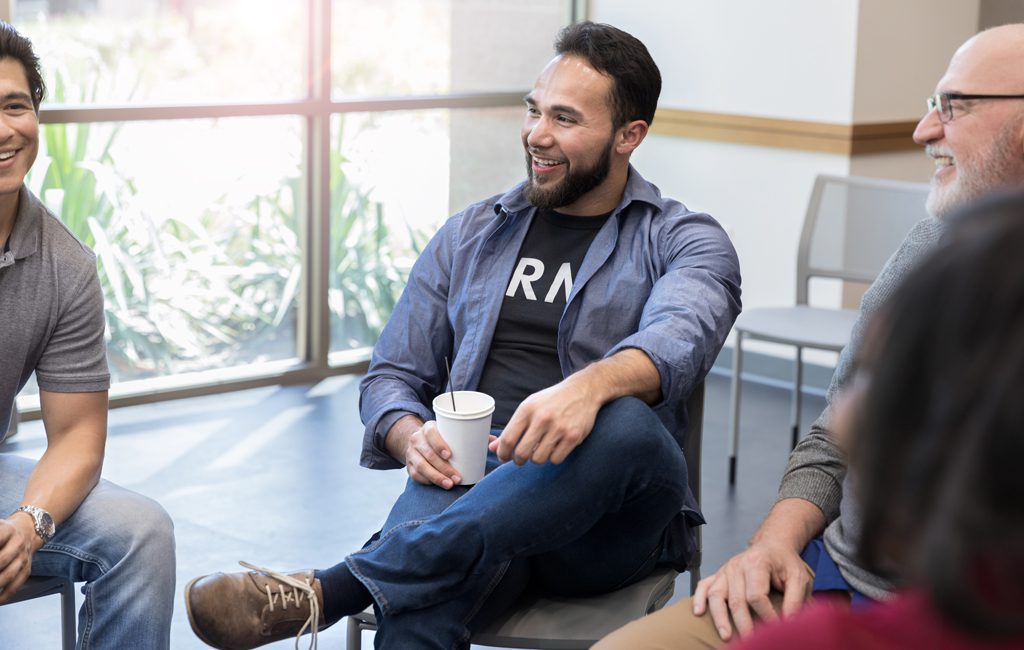Addiction Among Veterans
Questions About Treatment?
Our knowledgeable team is ready to discuss your situation and options. Your call is confidential with no obligation required.
How Many Veterans Experience Addiction?
The United States Department of Veterans Affairs defines a veteran as a person who has “served in the active military, naval, or air service, and who is discharged or released therefrom under conditions other than dishonorable.”1
While some of the experiences of our nation’s veterans can be deemed heroic, they are not always pleasant to live through. Many veterans will endure emotional turmoil and experience trauma during an active duty combat tour. They may also experience emotional, physical, or sexual trauma during their tour of duty. Others may have a difficult time readjusting to civilian life within their homes and communities after being discharged.

Scope of Addiction Among Veterans
Regardless of the root cause, data suggests that up to one in every fifty veterans from all branches of military service abuse a controlled substance. Additionally, up to 76% of veterans with a substance use disorder meet the diagnostic criteria for post-traumatic stress disorder (PTSD).2
Why do Veterans Experience Addiction?
Several mental health conditions and co-occurring disorders may lead veterans to experience addiction at higher rates than people without an Armed Services history. These will be detailed below.
PTSD and Substance Use Disorders
Post-traumatic stress disorder, or PTSD, is a mental health condition that may occur in people who witnessed or experienced a traumatic event, including active duty military deployments. As noted above, PTSD in veterans occurs at a staggering rate. In the absence of co-occurring addiction, some studies show that PTSD occurs in up to 75% of all veterans.3
People with PTSD experience disturbing, intense thoughts and feelings related to a traumatic experience long after the event has passed. They may relive the event through nightmares and flashbacks, experience anger and sadness, and feel isolated or detached from friends and loved ones. Someone with PTSD may actively avoid situations, people, or circumstances that could remind them of their trauma. They may have strong aversions to everyday stimuli, including loud noises or touch.
Other Disorders that Cause Addiction
In addition to PTSD, other physical and mental health conditions like chronic pain, traumatic brain injuries, sleep disorders, and depression can lead to co-occurring substance use disorders. The connection between veterans and depression is high. Studies conducted by the Veterans Administration estimate that 30% of all veterans visiting primary care clinics experience some form of depression. Studies also show that one out of every eight veterans meets the diagnostic criteria for major depression, requiring comprehensive treatment at a veterans mental health treatment program.4
Substance Use Disorders in the Military
Upon returning home, the occurrence of substance use disorders in veterans often rises sharply. Many traumas and challenges are associated with active duty employment, and many others are associated with discharge and returning to civilian life.
Prescription Drug Misuse in the Military
Many veterans have unique challenges related to chronic pain management. According to the National Institutes of Health, nearly two-thirds of veterans report experiencing chronic pain. Challenges related to pain management put veterans at a higher risk for opioid addiction and overdose.
Studies show that between 2001 and 2009, the number of veterans in the VA system receiving an opioid prescription increased from 17% to 24% . Similarly, the rate of opioid overdose for veterans increased from 14% in 2010 to 21% in 2016.5
Alcohol Use Disorders in the Military
A 2017 study by the National Survey on Drug Use and Health showed that veterans were more likely to use alcohol (57%) versus civilians (51%). They were also more likely to report instances of heavy alcohol use. Up to 65% of military veterans who enter a treatment program report that alcohol is the substance they most frequently misuse, a rate nearly double that of the general population.6
Veterans Treatment Options
Many veterans struggle significantly with their mental health upon returning home. Many hesitate to seek therapy or a treatment program because of the perceived stigmas that continue to surround mental health disorders. In turn, they may turn to drugs or alcohol to self-medicate their symptoms. As a result, many veterans experience symptoms of a dual diagnosis.
Dual Diagnosis
A dual diagnosis occurs when you have both a substance use disorder and a co-occurring mental health condition. It is crucial to choose a specialized treatment program at a veterans mental health treatment center equipped to address dual diagnosis conditions. Often, the symptoms of both are significantly intertwined, and therefore, it is vital to treat symptoms with one comprehensive, evidence-based plan.
Detox
Certain addictions, such as those to alcohol, opioids, and benzodiazepine, call for comprehensive detoxification to ensure a safe and effective first step to sobriety. Attempting to stop using these substances without support and guidance from a program specializing in addiction treatment and mental health care for veterans may lead to an increased risk for relapse after completing treatment.
Inpatient and Outpatient Care
After detoxing, the next step in a comprehensive addiction treatment program is therapy. Veteran-specific rehabilitation facilities like Great Oaks Recovery use proven, trusted addiction and mental health therapy models. Our treatments are designed to help you learn more about and understand the root causes of addiction.
Therapy will also teach you how to evaluate stressors and manage challenging situations without using drugs or alcohol in the future. Additionally, as your treatment program ends, we will work with you to develop an aftercare plan that ensures you have ongoing access to therapy, medical appointments, and peer support groups designed to help you maintain sobriety.
VA Health Care Benefits
A key concern for many individuals, including veterans, seeking help to overcome mental health or substance use disorders is how to pay for treatment. This leads to the common question: does the VA pay for addiction treatment? The short answer to this question is yes, veteran’s benefits programs provide many treatment options for veterans seeking treatment for substance use disorders. The services offered and covered by your benefits plan depend on your specific treatment needs and goals.
Programs offered through the Veterans Affairs office, including Tricare, Community Care, and the MISSION Act, provide various levels of coverage and treatment options for veterans seeking addiction treatment help. Below are a few frequently asked questions about VA benefits.
What is the Difference Between Veterans Choice, Community Care, and MISSION Act?
The Veterans Choice program is a federal program initially started in 2014 to rapidly expand access to care for veterans. The program ended on June 6th, 2019. The MISSION Act is the federal law that established a new Community Care program, among other provisions for veterans’ healthcare. Some of these provisions affect other types of care for veterans beyond community care.
What are My Costs and Co-Pays with Community Care?
Coherent charges are the same for Community Care options as at a VA medical facility. Generally, this means if you were required to pay a copayment at a VA facility, the same copayment would apply to a Community Care facility.

What About Private Insurance, Medicare, and Medicaid?
If you have other forms of healthcare coverage, including private insurance plans, Medicaid, Medicare, and Tricare, you can use VA healthcare benefits along with these plans. Your primary care provider or local VA benefits officer can help you better understand the pros and cons of maintaining private insurance and your VA benefits.7
There are many options available for veterans to seek the help they need to achieve lasting recovery from addiction and mental health concerns. To learn more about treatment and recovery at Great Oaks Recovery, contact our admissions team today for more information about our specialized programs for veterans.
Resources
- https://www.va.gov/OSDBU/docs/Determining-Veteran-Status.pdf
- https://nida.nih.gov/publications/drugfacts/substance-use-military-life
- https://www.statista.com/statistics/1202701/post-traumatic-stress-disorder-during-service-after-911-by-problem-veterans/
- https://www.research.va.gov/topics/depression.cfm
- https://nida.nih.gov/publications/drugfacts/substance-use-military-life
- https://www.va.gov/health-care/health-needs-conditions/substance-use-problems/
- https://www.va.gov/health-care/about-va-health-benefits/va-health-care-and-other-insurance/
Questions About Treatment?
Our knowledgeable team is ready to discuss your situation and options. Your call is confidential with no obligation required.

